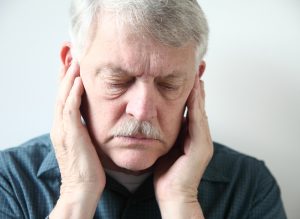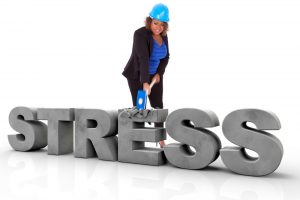During fight or flight, the body enters into an evolutionary mode of survival. The body produces various hormones to help one stay alive. These hormones increase blood pressure, elevate awareness, tense muscles and lower digestive functions. Since humanity’s early ancestors, the amygdala in the brain responds to threats or perceived threats. The sense of danger is later translated in the hypothalamus to order the Pituitary gland direct the adrenal glands above the kidneys to release various hormones. Adrenaline is released. In the process, cortisol helps one’s body react to danger by giving the body the energy to flee or fight.

Chronic stress can however lead to higher levels of cortisol which is not good for the body. The article, “How To Lower Your Cortisol Levels Safely, According To Experts” by Dylan Bailey takes a closer look at what high and low levels of cortisol can do to the body overtime and how to find ways to keep it in check. He states,
“Having high cortisol levels in short bursts is helpful, but long-term elevation of this steroid hormone can be damaging, says Nicole Golden, a National Academy of Sports Medicine (NASM) master trainer and owner of FWF Wellness in Sayre, Pennsylvania. In response to a stressor, cortisol levels are meant to rise in the short term as part of the “fight or flight” response to give you the energy needed to better deal with a temporary stressor or crisis, and even recover from an injury or illness. But, if this happens constantly, serious health complications could occur.”
“How To Lower Your Cortisol Levels Safely, According To Experts”. Baily, D. (2023). Forbes Health
To read the entire article, please click here
Commentary
Cortisol, often referred to as the “stress hormone,” is a vital hormone produced by the adrenal glands. It plays a crucial role in various bodily functions and is essential for our overall well-being. Understanding cortisol is key to managing stress and maintaining optimal mental and physical health.
Cortisol is released in response to stress, and its primary function is to help the body cope with challenging situations. It regulates various processes, including metabolism, immune response, and blood pressure. In times of stress, cortisol mobilizes energy by increasing blood sugar levels, providing a burst of energy to deal with the perceived threat.
The importance of cortisol cannot be understated. It helps regulate the sleep-wake cycle, enhances memory and cognitive function, and even influences mood and emotions. However, when cortisol levels become imbalanced due to chronic stress, it can have detrimental effects on our mental and physical well-being.
The role of cortisol in the body: Understanding its functions
Cortisol is involved in a wide range of physiological processes that are essential for our overall health. One of its primary functions is to regulate our body’s response to stress. When we encounter a stressful situation, cortisol is released to increase our alertness and prepare us for fight or flight.

In addition to its stress response role, cortisol also plays a crucial role in regulating our metabolism. It helps break down carbohydrates, proteins, and fats to provide energy for the body. Cortisol also influences blood sugar levels, ensuring a steady supply of glucose to the brain and muscles.
Cortisol has a significant impact on our immune system as well. It helps to suppress inflammation and regulate the immune response. However, chronic elevation of cortisol can weaken the immune system, making us more susceptible to infections and diseases.
The connection between cortisol and stress: How stress affects cortisol levels
Stress is a natural part of life, and our bodies are equipped with a stress response system to help us cope with it. When we encounter a stressful situation, whether physical or psychological, our bodies release cortisol to help us adapt and respond effectively. However, prolonged or chronic stress can disrupt this delicate balance and lead to elevated cortisol levels.
Chronic stress can arise from various sources, such as work pressure, relationship problems, financial difficulties, or traumatic events. When stress becomes chronic, cortisol levels remain elevated for extended periods, which can have adverse effects on our mental and physical health.
Research has shown that high cortisol levels due to chronic stress can contribute to anxiety and depression. Cortisol interacts with neurotransmitters in the brain, influencing our mood and emotions. Excessive cortisol can disrupt the balance of these neurotransmitters, leading to mood disorders.
The impact of cortisol on mental health: Exploring the link between cortisol and anxiety/depression
Cortisol levels play a significant role in mental health, particularly anxiety and depression. Studies have shown that individuals with anxiety disorders tend to have higher cortisol levels, especially in situations that trigger anxiety. This suggests a potential link between cortisol and the development or exacerbation of anxiety disorders.
Similarly, depression has also been associated with cortisol dysregulation. People with depression often exhibit abnormal cortisol patterns, such as elevated levels in the evening or flattened diurnal rhythms. This disruption in cortisol secretion can contribute to the persistence and severity of depressive symptoms.
It is important to note that while cortisol dysregulation may contribute to anxiety and depression, it is not the sole cause. Mental health disorders are complex, and various factors, including genetics, environment, and neurotransmitter imbalances, also play a role.
Cortisol and physical health: Examining the effects of cortisol on the immune system, metabolism, and weight gain/loss
Cortisol’s impact extends beyond mental health and affects various aspects of our physical well-being. One crucial area is the immune system. Cortisol regulates the immune response and helps prevent excessive inflammation. However, chronic elevation of cortisol can impair immune function, making us more susceptible to illnesses and infections.
Metabolism is another vital area influenced by cortisol. In times of stress, cortisol promotes the breakdown of stored energy sources, such as glycogen and fat, to provide the body with the necessary fuel. However, prolonged elevation of cortisol can lead to increased appetite, particularly for high-calorie foods, leading to weight gain.
On the other hand, chronic stress and high cortisol levels can also lead to weight loss in some individuals. Cortisol can accelerate muscle breakdown and inhibit muscle growth, leading to decreased muscle mass and overall weight loss.
Understanding the effects of cortisol on our physical health is crucial for maintaining a balanced lifestyle and preventing long-term health complications.
Chronic cortisol elevation: The dangers of prolonged high cortisol levels
While cortisol is essential for our survival and well-being, chronic elevation of cortisol can have severe consequences. Prolonged exposure to high cortisol levels can lead to a range of health issues, both physical and mental.
One of the primary concerns is the impact on cardiovascular health. Elevated cortisol levels can increase blood pressure and promote the deposition of cholesterol in the arteries, increasing the risk of heart disease and stroke. Chronic stress and cortisol dysregulation have also been linked to conditions such as diabetes and metabolic syndrome.

Furthermore, chronic cortisol elevation can have detrimental effects on cognition and memory. Excessive cortisol can impair memory retrieval and cognitive function, leading to difficulties with concentration, decision-making, and problem-solving.
It is important to recognize the signs of chronic cortisol elevation, such as persistent fatigue, weight gain, mood swings, and sleep disturbances. Seeking professional help and implementing strategies to manage stress and regulate cortisol levels are crucial for preventing long-term health complications.
Managing cortisol levels: Tips for reducing stress and regulating cortisol production
Managing stress effectively is key to maintaining balanced cortisol levels and promoting optimal well-being. Here are some practical tips for reducing stress and regulating cortisol production:
- Practice stress-reducing techniques: Engage in activities such as meditation, deep breathing exercises, yoga, or mindfulness to help calm the mind and relax the body.
- Prioritize self-care: Take time for yourself and engage in activities that bring you joy and relaxation. This can include hobbies, spending time in nature, or engaging in creative outlets.
- Maintain a healthy lifestyle: Regular exercise, a balanced diet, and adequate sleep play a crucial role in managing stress and regulating cortisol production.
- Seek social support: Surround yourself with a supportive network of friends and family who can provide emotional support during challenging times.
- Set boundaries: Learn to say no and prioritize your well-being. Establishing healthy boundaries can help reduce stress and prevent overload.
Implementing these strategies can help reduce stress and promote a healthier balance of cortisol in the body.
Testing cortisol levels: How to measure and monitor cortisol in the body
If you suspect that your cortisol levels may be imbalanced, it is essential to consult with a healthcare professional. They can perform tests to measure and monitor cortisol levels in your body.
The most common method of testing cortisol is through a saliva or blood test. Saliva tests are non-invasive and can be done at home. They measure cortisol levels at specific times of the day to assess the diurnal rhythm. Blood tests provide a more comprehensive picture of cortisol levels but require a visit to a healthcare facility.
Interpreting cortisol test results should be done in consultation with a healthcare professional, as they can provide insights into your specific situation and guide you towards appropriate interventions if necessary.
Natural ways to balance cortisol: Lifestyle changes, diet, and supplements that can help regulate cortisol levels
In addition to stress management techniques, certain lifestyle changes, dietary choices, and supplements can help regulate cortisol levels naturally. Here are some suggestions:
- Get regular exercise: Engaging in regular physical activity can help reduce stress and regulate cortisol production. Aim for a mix of aerobic exercises, strength training, and mind-body practices like yoga or tai chi.
- Adopt a balanced diet: Consume a diet rich in whole foods, including fruits, vegetables, lean proteins, and healthy fats. Avoid excessive caffeine and refined sugars, as they can contribute to cortisol dysregulation.
- Prioritize sleep: Establish a consistent sleep routine and aim for 7-9 hours of quality sleep each night. Poor sleep can disrupt cortisol rhythms and contribute to stress.
- Consider adaptogenic herbs: Adaptogens like ashwagandha, rhodiola, and holy basil have been traditionally used to support the body’s stress response and regulate cortisol levels. Consult with a healthcare professional before starting any new supplements.
- Practice relaxation techniques: Incorporate techniques such as progressive muscle relaxation, guided imagery, or aromatherapy to promote relaxation and reduce stress.
Remember, it is essential to consult with a healthcare professional before making any significant changes to your lifestyle or starting new supplements.
Conclusion: Understanding the importance of cortisol in maintaining overall well-being
Cortisol plays a vital role in our mental and physical well-being. It helps regulate our stress response, metabolism, immune function, and various other physiological processes. However, chronic stress and elevated cortisol levels can have adverse effects on our health, leading to mental health disorders, compromised immune function, weight gain or loss, and other complications.

By understanding the science behind cortisol and implementing strategies to manage stress effectively, we can maintain a healthier balance of cortisol in our bodies. Prioritizing self-care, engaging in stress-reducing activities, and adopting a balanced lifestyle can go a long way in promoting optimal mental and physical well-being.
Remember, if you suspect any imbalances in cortisol levels, it is crucial to consult with a healthcare professional who can provide personalized guidance and support. Take control of your stress levels and nurture your overall well-being.
Please also review AIHCP’s Stress Management Consulting Program. The program is online and independent study and open to qualified professionals seeking a four year certification in Stress Management.
Additional Readings
“What Are the Symptoms and Causes of High Cortisol Levels?”. Santos-Longhurst, A. (2023). Healthline. Access here
“Cortisol”. (2021). Cleveland Clinic. Access here
“What Is Cortisol?”. WebMed Editorial Contributors. (2022). Access here
“Cortisol and stress: What is the connection?”. Tee-Melegrito, R. (2023) Medical News Today. Access here

























